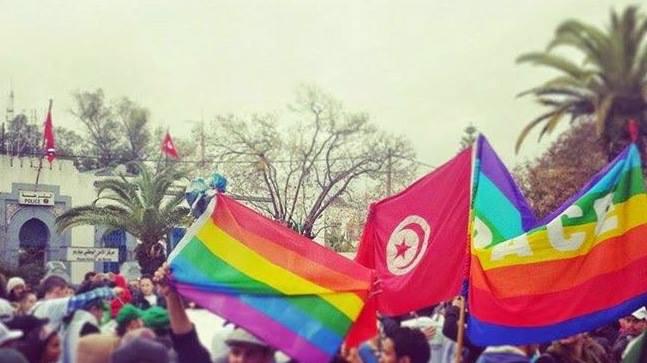Tunisian Police Shut Down Dissent
| Publisher | Human Rights Watch |
| Publication Date | 1 February 2018 |
| Cite as | Human Rights Watch, Tunisian Police Shut Down Dissent, 1 February 2018, available at: https://www.refworld.org/docid/5a8eb1073.html [accessed 22 May 2023] |
| Disclaimer | This is not a UNHCR publication. UNHCR is not responsible for, nor does it necessarily endorse, its content. Any views expressed are solely those of the author or publisher and do not necessarily reflect those of UNHCR, the United Nations or its Member States. |
LGBT and Secular Protestors Targeted
February 1, 2018 2:43PM EST
By Neela Ghoshal
 Tunisian and rainbow flags were raised at a march against terrorism during the World Social Forum in Tunis, March 2015. © 2015 Mawjoudin Association
Tunisian and rainbow flags were raised at a march against terrorism during the World Social Forum in Tunis, March 2015. © 2015 Mawjoudin Association
When Tunisian police shut down a planned demonstration on January 27, they claimed they did it for the protesters' safety. "We had information that they were going to be targeted," said an interior ministry spokesperson, according to news reports.
The rallying call of Saturday's protest, organized by the secular group Association des Libres Penseurs (Association of Free Thinkers), or ALP, was "Sayebni" – "let me be" in Arabic. Organizers knew some of their demands might be controversial: freedom of conscience, gender equality, and the elimination of "retroactive laws" such as section 230 of the penal code, which criminalizes consensual same-sex conduct, and section 52, which imposes harsh sentences for cannabis possession and use.
But the authorities' claim they were looking out for activists' own good doesn't hold water. International law obliges governments to take necessary steps to ensure peaceful protests can take place in safety and security. That may mean providing police protection to protesters in order to prevent any security incidents that might arise, such as attacks by violent counter-protesters.
Mounir Baatour, an activist working with ALP and the lesbian, gay, bisexual and transgender (LGBT) rights organization Shams, told Human Rights Watch that the Association of Free Thinkers notified the authorities of the planned protest, as required under Tunisian law, on January 24. On January 26, after Shams publicly supported the protest and put out a call for LGBT people to attend, Interior Ministry officials summoned ALP's president and told him the protest was prohibited, without further explanation. "There was no security threat. It's because the authorities are homophobic."
The forceful dispersion of protestors suggests authorities' objections to the demonstration extended beyond participants' "safety." Baatour said police shoved and hit several LGBT protestors, twisting the arm of the director of Shams. Police briefly detained, without charge, two activists for attempting to wave a rainbow flag.
"Tunisia has, at times, allowed for demonstrations critical of government policy, but Saturday's shutdown – following on the heels of a range of police abuses during protests in early January over the adoption of austerity measure - raises questions about the depth of Tunisia's commitment to the fundamental right to peaceful protest."
The Tunisian authorities cannot pick and choose. Abiding by their international human rights obligations means allowing diverse voices to be heard – including the voices of sexual and gender minorities.
Link to original story on HRW website

